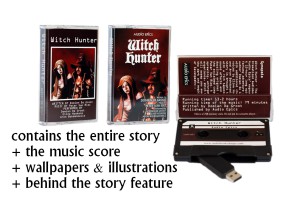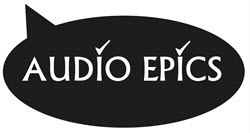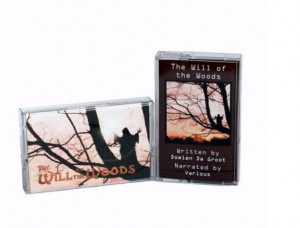This topic seems to be the most contentious one within the audio drama community. Many contributors to the world of contemporary audio storytelling have strong opinions about having a narrator in the story or not. So why is this such an important question?
At its heart, I think the discussion surrounding narration is about the clear distinction between audio drama and audiobooks. Creators of audio drama want to make it very clear that their work is nothing like “those dry audiobooks”. Since audio drama is such a niche product, this is understandable. It’s very obvious that most ordinary people don’t even know there is a difference between the two media. To an audio drama producer, this can be very frustrating because they know there IS a huge difference, and of course they’re right.
I think on a subconscious level, most audio drama makers are afraid that the average person will stumble upon a dry audiobook on Audible, listen to it and decide that this audio stuff is far too boring and not for them. Consequently, this person will never try out audio drama. Again, I think this fear is not unwarranted. People often really are that quick to judge.
On the other hand, there is also the opposite scenario: a listener enjoys a good audiobook, goes looking for more and stumbles upon a richly cinematic, modern audio drama production like We’re Alive. And hates it.
This opposite scenario usually doesn’t enter the mind of the audio drama enthusiast, because he has a strong bias in favour of the more theatrical approach. To him, audio drama is simply a superior alternative to audiobooks, therefore it’s impossible that anyone who enjoys audiobooks will dislike audio drama.
I can imagine someone having this reaction, though. Audiobooks do have certain positive qualities that audio drama lacks. This doesn’t mean that I prefer audiobooks, but that I can see reasons for either preference. Personally, I can enjoy both mediums, but I also have problems with both of them. It’s these problems that I’d like to address in this article, as well as explain my “solution”. I put that last word between quotation marks because I am well aware that to some people, my solution will not be experienced as such. If you really love what I call the “dry audiobook” or the “audio movie”, then you may not like my approach. On the other hand, if you love audio but experience the same issues with it that I do, then you may like what I propose.
The Dry Audiobook
Ever since Audible, this medium has become massively popular. It is in fact much more popular than audio drama is. For that reason alone, it cannot simply be discarded as inferior. Many audio drama enthusiasts will feel that fans of audiobooks simply haven’t “discovered” audio drama yet and will cite that as the sole reason why dry audiobooks are still more popular. I personally don’t think so. I think that audiobooks really do have a wider appeal.
When I use the term “dry audiobook”, I mean a novel that’s simply read by one voice. This is what the vast majority of audiobooks are like. Even within this simply defined medium, there are still many different approaches. Some dry audiobooks are read by very neutral narrators. They do this with the intent of “getting out of the picture” so that it’s really the author’s words that draw the listener’s attention, not the performance of the narrator. Other audiobooks go for a very lively performance, where the narrator goes out of his way to use different voice qualities and accents to portray various characters. David Tennant’s performance for the excellent How To Train Your Dragon series is a particularly exciting example of this. Of course, How To Train Your Dragon is a series of children’s books full of comical characters, where exaggerated performances are entirely appropriate. More serious epic fantasy like The Wheel of Time wouldn’t ever work if it were performed in this way. Among audiobook fans, the man who voices Robert Jordan’s enormous series is held in very high regard. His name is Michael Kramer, and he has become somewhat of a staple of epic fantasy audiobooks, having narrated most of Brandon Sanderson’s work as well as newer series such as Circle of Reign and The Licanius Trilogy. Kramer’s performance is soulful but reserved at the same time. He is an excellent narrator with a very recognisable voice. He seems to find a third way between heavily performing (like David Tennant does) and doing a Stephen Hawking impression (which only a minority of audiobook lovers enjoy).
To some, the dry audiobook is the ideal way of experiencing a novel. More than an audio drama, an audiobook is a book. It’s every word the author wrote. Many audiobooks are performed by the authors themselves, which is an even bigger plus, at least if the author has a pleasant voice and is capable of performing his work well. Much as I love Brandon Sanderson’s writing, I wouldn’t want to sit through his massive epics performed in his nasal, high-pitched American twang.
Audiobooks have a wonderful intimacy to them. You feel invited into the story. They speak to us, not just literally, but also on some subconscious level, bringing us back to the oldest form of storytelling around the campfire.
Still, as wonderful as performances like Kramer’s and Tennant’s are, dry audiobooks always remain kind of, well, dry. Listening to a single voice for hours and hours can become a chore, no matter how pleasant that voice is. In fact, voices that are easy on the ears tend to be soft and smooth. As a result, they can lull people to sleep. It’s also easy to get distracted when you’ve been listening to a single voice for many hours.
The audio movie
On the complete opposite end of the spectrum, we have what I call the “audio movie”. This is audio drama at its most dramatic. The creators of these shows eschew narration, opting instead to bring the story to life entirely through acting, sound effects and music. Popular online series such as Edict Zero and We’re Alive are great examples of this, as well as Locke & Key, which was released on Audible and features music by our very own Peter Van Riet! Another great example is Tim Knofler’s wonderful, pulpy World War II epic The Adventures of Captain Hudson (my personal favourite in this genre).
Audio movies go for the immediate experience. Everything in the story is happening right now and we, as the listener, are right there in the thick of it with the characters. When done well, it can be an immersive experience that appeals very strongly to the imagination as well as our thirst for spectacle. Because there is no image, the listeners’ experience of the audio is enhanced and their imagination is kicked into high gear. That in itself is wonderful, of course.
In the audio drama circles I visit, this approach to audio storytelling is much preferred over narration. In fact, I think there is almost an atmosphere of phobia when it comes to narration. I notice that a lot of audio drama makers in this area go out of their way to avoid using a narrator whenever possible. I think they see narration as a kind of copout, and direct audio theatre as vastly superior. Personally, I’m inclined to disagree. Don’t get me wrong, there is a lot to love about audio movies. However, just like dry audiobooks, they have certain built-in flaws.

When they have a unity of time and place, audio movies can do their work very well and convey the atmosphere brilliantly. Aural Stage’s Intensive Care is a great example of this. The entire story takes place in a very creepy hospital and the production really makes you feel like you’re there. By the end, you’re relieved to escape from that hellish place and ready to welcome reality once more.
On the other hand, when trying to tell a story that takes place in a number of different locations, audio cinema becomes a lot harder to pull off satisfactorily. NPR’s Star Wars adaptations are often cited as the proof that it can be done, but they don’t really count because they build on the experience of the movies. I don’t think anyone who has never heard of the Star Wars films has ever listened to those audio dramas (if those people even exist in the first place). As a result, these adaptations can get away with not describing what Darth Vader or the Death Star looks like, because the audience already knows. The audio dramas are a wonderful “extended edition” of the movies, but they do not stand on their own as pure audio.
In my view, the directness of audio movies leads to either of two problems:
- Confusion
- “Auto-narration”
Allow me to explain what I mean by confusion. When nobody describes what’s happening in a scene, it can be very difficult to have any idea of what’s going on. When this happens, I lose interest. Even when the sound design is sublime and the music is great, a big exciting scene falls completely flat when I don’t know what’s going on. This is a very big problem with audio movies for me. During normal dialogue scenes, it flows very well, but as soon as the monsters attack or the car chase begins, I feel like I’m blindly stumbling through the story. Someone may have died during that action scene but I’m only aware of it ten minutes later. People differ, but to me this is the worst thing that can happen in an audio story. I vastly prefer the dryness of an audiobook over this confusion.
To avoid this pitfall, audio movies often go for an approach I call “auto-narration”. This is when the characters themselves describe what they’re seeing or doing. It tends to feel very forced and unrealistic and leads to dialogues like this:
- A: Look, it’s a monster!
- B: Yes, I see… It seems to be rather pale, and it has long fangs!
- A: Indeed, we should probably run.
There are ways to work around this and make the auto-narration sound a bit more natural, but it’s very hard to avoid awful dialogue like this when dealing with audio movies.
Another issue I sometimes have with audio movies is a bit more subjective. While they can be exciting, they can also be a bit exhausting. Even when they manage to avoid both confusion and auto-narration, following a story purely by listening in while the characters talk and act can be a fairly taxing activity. While I appreciate the often scrumptious sound design and varied voice performances, listening to this kind of production demands more of me and often leaves me a bit fatigued.
The Dramatized Audiobook
I have presented the advantages and problems particular to “dry audiobooks” and “audio movies”. Of course, there is a lot in between. My favourite audio dramas are BBC’s The Lord of the Rings and A Wizard of Earthsea and Focus on the Family’s The Chronicles of Narnia. Of course, the source material plays its role in why I love these audio dramas so much, but I also really appreciate them as examples of their medium. All of these productions succeed in bringing characters to life through voice acting and placing listeners in an environment through sound and music. At the same time, their storytelling is very clear and pleasant.
The typical approach these stories take is one where scenes simply play out between actors and sound effects, just like in an audio movie, but a narrator is introduced to connect different scenes to each other and to describe new elements that are introduced. The creators of these stories do their best to use narration to frame scenes and not allow it to interrupt the flow of the ongoing story. This is the approach I used when I wrote The Will of the Woods as well.
I see no real problems with this approach, except that it can still suffer from the pitfalls of the “audio movie” without the bonus of having a continuous, direct experience. On the whole, though, I think it’s a good approach.
Recently, I have also discovered Graphic Audio. When you go to their website, please ignore the horrible artwork they have for their productions. This is an amazing company that does spectacular sound design and uses that quality to bring audiobooks to life. Different characters are performed by different actors, but what you’re hearing is still very much an audiobook, using a narrator as the main voice throughout the story. When I discovered this approach, I fell in love with it. I adopted it myself for Witch Hunter, calling it “dramatized audiobook”. It’s a lively experience, full of exciting things to listen to, but it’s also carried by the narrator.
 You see, there are certain things only a narrator can do, like introducing background elements from fantasy lore without it being jarring. Representing the inner thoughts and feelings of a particular character can also only be done fluently in either a novel or an audiobook. I know that pure audio dramas have experimented with this by using an acoustic effect to differentiate between a character’s spoken words and its thoughts. In my opinion, that works well in comedy but nowhere else.
You see, there are certain things only a narrator can do, like introducing background elements from fantasy lore without it being jarring. Representing the inner thoughts and feelings of a particular character can also only be done fluently in either a novel or an audiobook. I know that pure audio dramas have experimented with this by using an acoustic effect to differentiate between a character’s spoken words and its thoughts. In my opinion, that works well in comedy but nowhere else.
Finally, I simply love narrators. Like I described earlier, there is nothing quite like being told a story the way humans have done for thousands of years.
In my opinion, the Dramatized Audiobook is the “solution” to the problems of the dry audiobook and the audio movie. Of course, I realise this is a subjective opinion. If you prefer your audiobooks to be more intimate, without pointless noise in the background, I completely understand. If you prefer your audio drama to be one fluent, direct experience, immersing you right in the thick of it, I can appreciate that as well. It’s just that for me, the Dramatized Audiobook fixes what I dislike about the other categories of audio storytelling, and it will probably be the way Audio Epics goes forward from now on.

